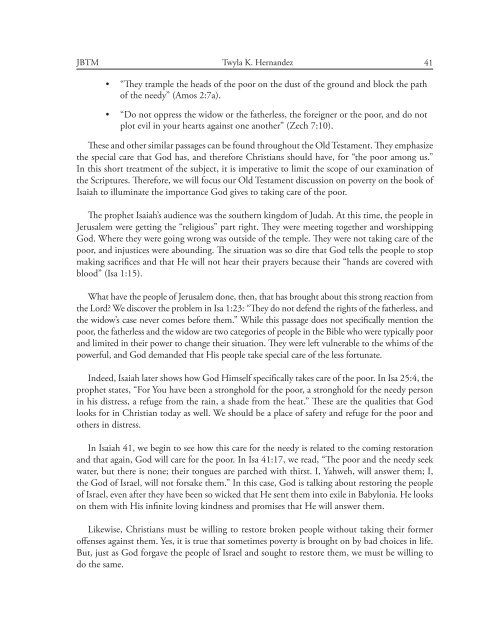JBTM_10-2_Fall_2013
JBTM_10-2_Fall_2013
JBTM_10-2_Fall_2013
You also want an ePaper? Increase the reach of your titles
YUMPU automatically turns print PDFs into web optimized ePapers that Google loves.
<strong>JBTM</strong><br />
Twyla K. Hernandez<br />
41<br />
• “They trample the heads of the poor on the dust of the ground and block the path<br />
of the needy” (Amos 2:7a).<br />
• “Do not oppress the widow or the fatherless, the foreigner or the poor, and do not<br />
plot evil in your hearts against one another” (Zech 7:<strong>10</strong>).<br />
These and other similar passages can be found throughout the Old Testament. They emphasize<br />
the special care that God has, and therefore Christians should have, for “the poor among us.”<br />
In this short treatment of the subject, it is imperative to limit the scope of our examination of<br />
the Scriptures. Therefore, we will focus our Old Testament discussion on poverty on the book of<br />
Isaiah to illuminate the importance God gives to taking care of the poor.<br />
The prophet Isaiah’s audience was the southern kingdom of Judah. At this time, the people in<br />
Jerusalem were getting the “religious” part right. They were meeting together and worshipping<br />
God. Where they were going wrong was outside of the temple. They were not taking care of the<br />
poor, and injustices were abounding. The situation was so dire that God tells the people to stop<br />
making sacrifices and that He will not hear their prayers because their “hands are covered with<br />
blood” (Isa 1:15).<br />
What have the people of Jerusalem done, then, that has brought about this strong reaction from<br />
the Lord? We discover the problem in Isa 1:23: “They do not defend the rights of the fatherless, and<br />
the widow’s case never comes before them.” While this passage does not specifically mention the<br />
poor, the fatherless and the widow are two categories of people in the Bible who were typically poor<br />
and limited in their power to change their situation. They were left vulnerable to the whims of the<br />
powerful, and God demanded that His people take special care of the less fortunate.<br />
Indeed, Isaiah later shows how God Himself specifically takes care of the poor. In Isa 25:4, the<br />
prophet states, “For You have been a stronghold for the poor, a stronghold for the needy person<br />
in his distress, a refuge from the rain, a shade from the heat.” These are the qualities that God<br />
looks for in Christian today as well. We should be a place of safety and refuge for the poor and<br />
others in distress.<br />
In Isaiah 41, we begin to see how this care for the needy is related to the coming restoration<br />
and that again, God will care for the poor. In Isa 41:17, we read, “The poor and the needy seek<br />
water, but there is none; their tongues are parched with thirst. I, Yahweh, will answer them; I,<br />
the God of Israel, will not forsake them.” In this case, God is talking about restoring the people<br />
of Israel, even after they have been so wicked that He sent them into exile in Babylonia. He looks<br />
on them with His infinite loving kindness and promises that He will answer them.<br />
Likewise, Christians must be willing to restore broken people without taking their former<br />
offenses against them. Yes, it is true that sometimes poverty is brought on by bad choices in life.<br />
But, just as God forgave the people of Israel and sought to restore them, we must be willing to<br />
do the same.


